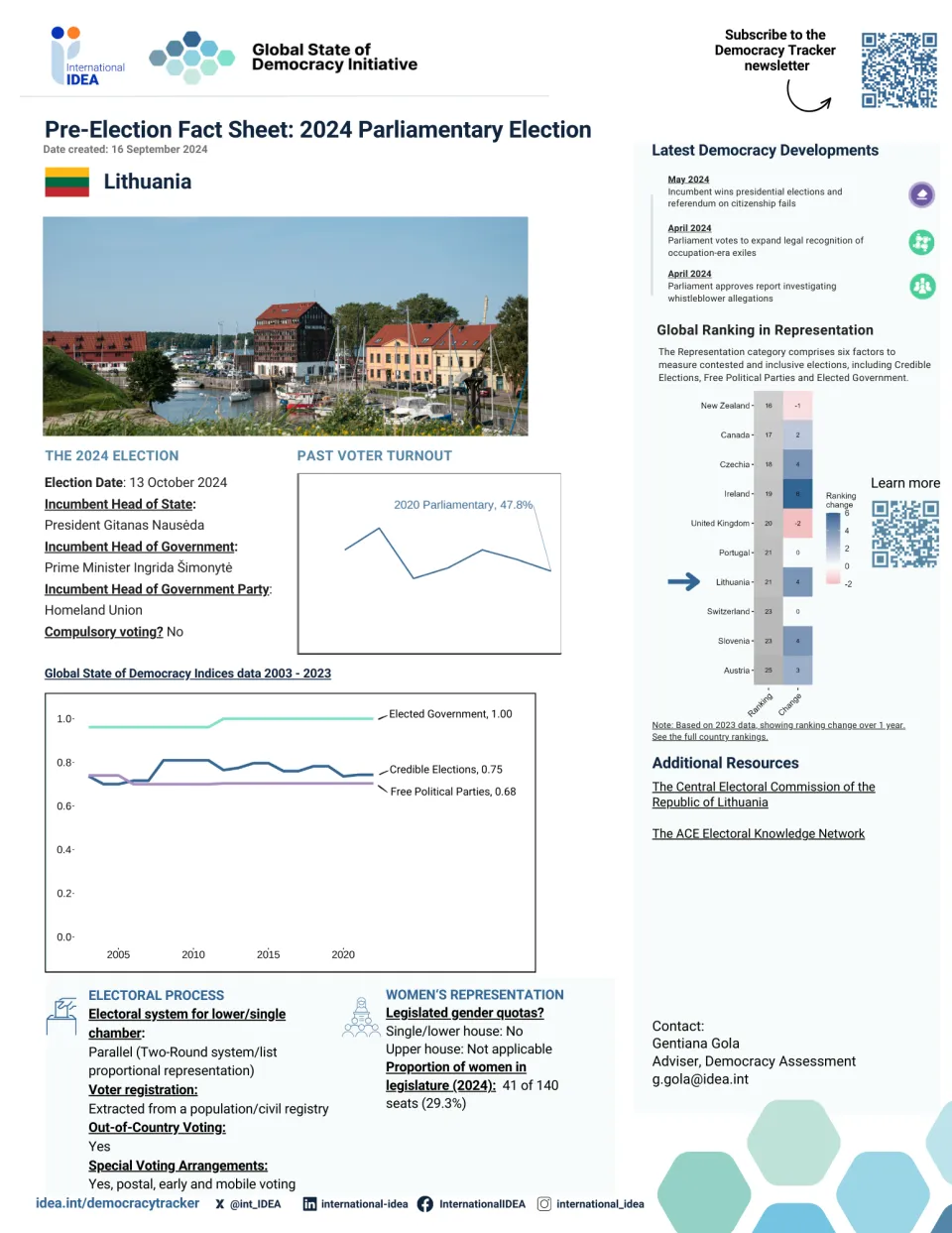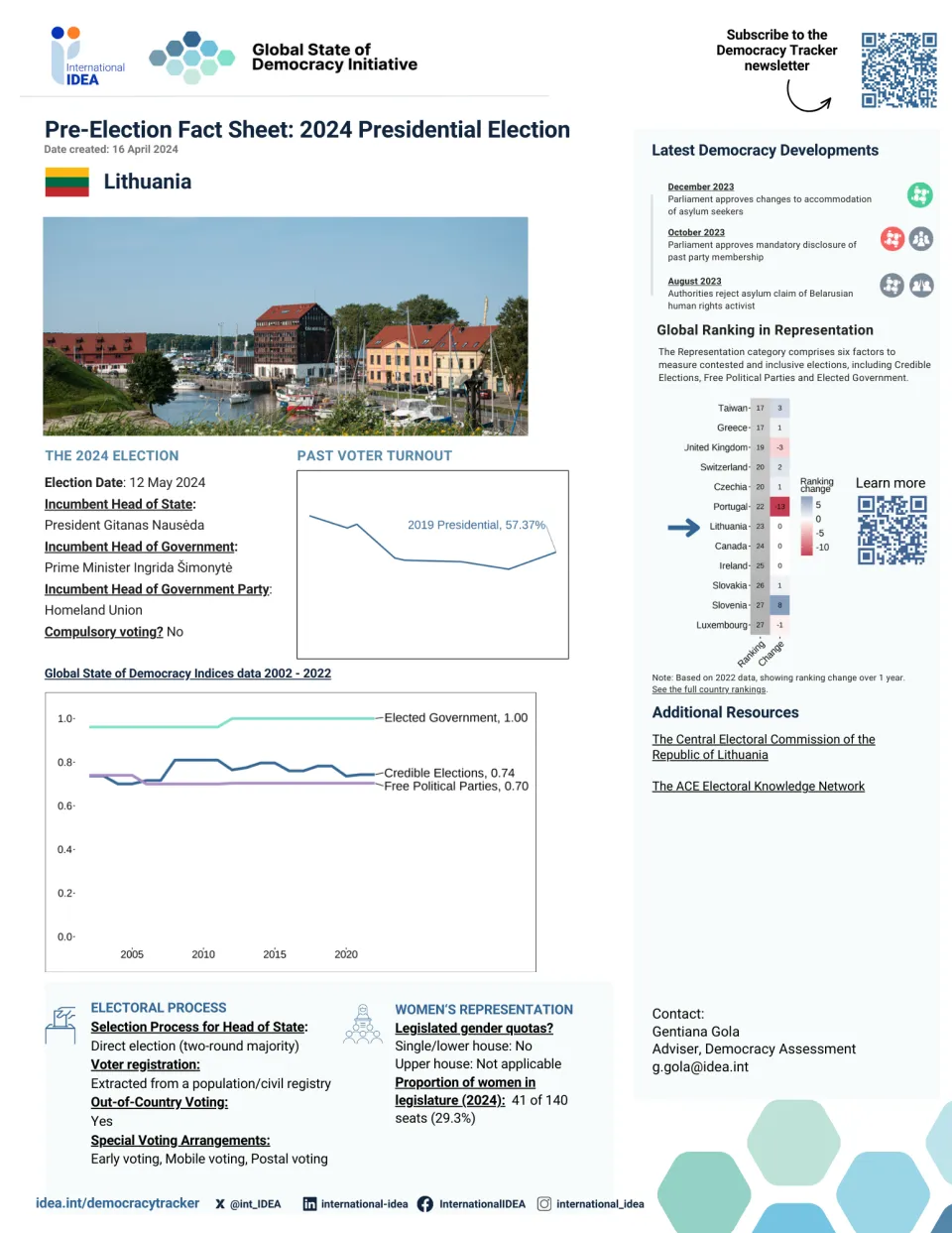
Lithuania
Lithuania performs in the high range in Representation and Rights, and exhibits mid-range performance in the Rule of Law and Participation categories of the Global State of Democracy (GSoD) framework. The country performs amongst the top 25 per cent of countries at the global level in nearly all factors, except for Civic Engagement and Electoral Participation. Between 2019-2024, Lithuania has significantly advanced in Access to Justice, with no significant declines. Lithuania is a high-income economy with a robust services sector. Although high levels of emigration have led to labour shortages, a growing number of young people are returning, attracted by Lithuania’s affordable education and thriving information technology sector. A majority (56 per cent) of Lithuanian respondents reported perceptions of intergenerational progress in International IDEA’s Perceptions of Democracy Survey.
Lithuania was established in 1236, after local fiefdoms were united under Grand Duke Mindaugas. The country has been occupied by foreign powers for much of the past century, and experienced repression under the Russian empire until the end of World War I, and later by Nazi Germany and the Soviet Union. Lithuania declared independence from the Soviet Union in 1990. The country has a relatively ethnically homogenous population, with national minorities including 6.5 per cent Poles and 5 per cent ethnic Russians. Unlike other Baltic states, the Church retains a high level of influence in Lithuania, and as much as four-fifths of the population is Roman Catholic. Despite overall political stability, trust in political parties remains low in Lithuania and there have been instances of political corruption, including a 2023 municipal expenses scandal. These factors have contributed to growing voter apathy.
Due to Lithuania’s geographical position bordering Russia and Belarus, political debate is often coloured by national security concerns. The government has claimed that Belarusian authorities are deliberately facilitating migration flows to exert political pressure on Lithuania (commonly termed migrant “instrumentalization”), and has taken steps to tighten border security, erect a border fence, and enact tougher migration measures.
Lithuania has consistently been a high performer in Gender Equality. Despite recent gains in women’s political representation, women’s leadership in parliamentary commissions and mayoral positions remains low. However, the gender pay gap remains a pronounced challenge, as well as gaps in pensions between men and women. Amid stagnation in LGBTQIA+ rights and persistent perceptions of discrimination within LGBTQIA+ communities, recent court rulings marked a breakthrough by recognizing a same-sex partner as a legal parent for the first time and by annulling legal provisions adopted in 2009 that restricted LGBTQIA+ content for minors.
Going forward, it will be important to monitor how the government addresses concerns about migration with potential impacts on Rights. Particular attention should be paid to ongoing litigation, including a 2024 class action law suit filed by migrants over arbitrary detention, as well as cases pending before the European Court of Human Rights and International Court of Justice concerning the human rights implications of the instrumentalization of migration. At the same time, it will be important to watch Social Group Equality in light of the Constitutional Court’s recent ruling that excluding same-sex partnerships from the civil code is unconstitutional. Finally, recent legislation providing Romuva with the status of a state-recognised religious association and guaranteeing the rights of national minorities should be monitored for impacts on Social Group Equality and Civil Liberties.
Last updated: July 2025
https://www.idea.int/democracytracker/
April 2025
Constitutional Court rules excluding same-sex partnerships from civil code unconstitutional
On 17 April, the Constitutional Court ruled that the Civil Code’s definition of domestic partnership—limited to unions between a man and a woman—is unconstitutional. It found the provision conflicts with the constitutional principles of the protection of dignity, the protection of private life, and equality and non-discrimination. The Court also noted that the lack of legislation recognizing civil partnerships for unmarried cohabiting couples created legal uncertainty and eroded public trust in the state. The Court ruled that Parliament must adopt legislation regulating the procedure for the registration of civil partnerships but did not set a deadline. A civil union bill which would provide certain legal protections to same-sex couples (including inheritance rights and shared property), passed two readings in parliament in 2023 but was not put to a final vote due to a lack of support. The case was initiated by the former centre-right government.
Sources: ConstitutionNet, Baltic Times, LRT, Constitutional Court, WIPO
Constitutional Court calls for equality in access to assisted reproduction
On 10 April, the Constitutional Court ruled that restricting access to assisted reproduction services to people in a marriage or registered partnership contradicts the Constitution. The ruling pertains to publicly funded services, as well as private clinics. The Court found no objective justification for the Law on Assisted Reproduction’s difference in treatment of people facing infertility according to marital status, deeming it discriminatory under Article 29 of the Constitution, as it limits rights based on family situations. It further found the legislature failed to comply with the requirement to ensure universal access to healthcare (Article 53). The Court emphasised that reproductive health services should be based on medical need, not personal circumstances. The ruling will enter into force on 10 April 2026, giving the legislature time to pass legislation ensuring access to assisted reproduction services to single women and unmarried couples.
Sources: Constitutional Court, LRT, Ministry of Health
January 2025
New law guaranteeing rights of national minorities enters into force
On 1 January, a new Law on National Minorities entered into force, 15 years after the previous law on national minorities expired in 2010. Parliament approved the new law in November 2024 with 67 votes in favour and four abstentions. Lithuania is home to around 432,000 members of national minorities according to a 2021 census, including Poles, Russians, Belarusians, Ukrainians, Jews, Tatars and Roma, among others. The law guarantees national minorities can use their languages without restriction in private and public life, including to receive education and to disseminate information via mass media in their languages. The law also provides for the right to form political organizations and establishes the Council of National Minorities to represent the interests of national minorities in cultural, social and economic issues.
Sources: LRT (1), LRT (2), Department of National Minorities (1), Department of National Minorities (2), Council of Europe, Seimas
December 2024
Religious association receives long-awaited state recognition
On 12 December, Parliament voted to officially recognize Romuva, a pagan religious association. The status of a state-recognized religious association gives the right for Romuva ministers to perform religious marriages with the same effect as civil marriages, the right to broadcast its religious services, the right to provide religious education in schools, as well as an exemption from the payment of land tax. Similar legislation had failed to pass Parliament on several occasions, most recently in 2023. In 2021, the European Court of Human Rights (ECHR) found the Parliament’s previous refusal to recognize the association violated Romuva rights, and concluded that the MPs who voted against state recognition had failed to remain neutral and impartial in the exercise of their powers. There are around 3,917 Lithuanians identifying as Romuva according to the 2021 national census.
Sources: Seimas, LRT, ECHR (1), ECHR (2), Romuva, International Journal for Religious Freedom
Constitutional Court finds limits on LGBTQIA+ content for minors unconstitutional
On 20 December, the Constitutional Court annulled a provision of the Law on the Protection of Minors (adopted in 2009) limiting the spread of public information “expressing contempt for family values” that was used to restrict content about same-sex relationships. The Court found the provision violated parts of the Constitution relating to freedom of expression (Article 25) and the right to family life (Article 38). The ruling found the provision narrowed the concept of the family, citing the duty of the state to ensure children’s development is based on the “values of equality, pluralism, and tolerance.” The Justice Ministry asked the Constitutional Court to review the law following a 2023 ruling of the European Court of Human Rights, which found a violation of author Neringa Macatė’s right to freedom of expression, after the distribution of her children’s books depicting same-sex couples was restricted under the law.
Sources: JURIST, LRT, ECHR, Constitutional Court, LGL
Court legally recognizes same-sex parenthood
On 6 December, a Vilnius District Court ruling that recognized Jūratė Juškaitė as the mother of a child born to her partner came into effect. The decision, reached on 6 November, makes it possible for Juškaitė to request Vilnius municipality’s civil registry to list her as the child’s mother in official documents, and marks the first time a same-sex partner has secured the legal status of parenthood. Legal parenthood entails the right to parental leave, inheritance rights for the child, as well as the right to act as the child’s legal representative, which for example enables Juškaitė to seek medical care for her child without the need for special authorization. Lithuania does not legally recognize same-sex partnerships, and draft legislation recognizing same-sex partnerships has struggled to gain sufficient support in Parliament.
Sources: LRT, Baltic Times, 15min, TV3
November 2024
Outcry against inclusion of party with antisemitic links in government
On 11 November, the Social Democratic Party of Lithuania signed a coalition agreement including the Nemunas Dawn party, which placed third in the October parliamentary elections. In April, the Constitutional Court found the Nemunas Dawn party’s leader, Remigijus Žemaitaitis, violated the Constitution over antisemitic public statements. He resigned from Parliament in April rather than face an impeachment vote and is currently being investigated for inciting hatred against Jewish people. Thousands of people demonstrated in Vilnius, calling for zero tolerance to antisemitism. In parallel, 30 civil society organisations signed an open letter calling for Nemunas Dawn to be left out of the new coalition, initiated by the European Movement and the Lithuanian Center for Human Rights.
Sources: International IDEA, LRT (1), LRT (2), Reuters, JURIST, Constitutional Court
See all event reports for this country
Global ranking per category of democratic performance in 2024
Basic Information
Human Rights Treaties
Performance by category over the last 6 months
Election factsheets
Global State of Democracy Indices
Hover over the trend lines to see the exact data points across the years
Factors of Democratic Performance Over Time
Use the slider below to see how democratic performance has changed over time

